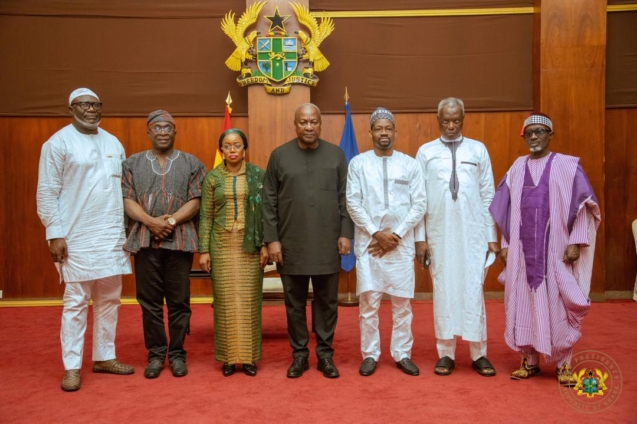President John Dramani Mahama has inaugurated a new Hajj Board chaired by Alhaji Ibrahim Tanko, tasking its members to run Ghana’s annual pilgrimage with integrity, professionalism and modern efficiency.
Speaking during the swearing-in ceremony, President Mahama outlined five key priorities the Board must deliver on: early planning, transparency and accountability, the welfare and safety of pilgrims, courtesy and discipline among officials, and effective stakeholder communication.
Early, predictable planning
The President urged the Board to begin preparations for the next Hajj immediately to avoid the last-minute adjustments that have often triggered confusion and anxiety among prospective pilgrims.
He said schedules, registration processes and cost structures must be released well in advance to give pilgrims certainty and confidence.
Transparency and accountability
President Mahama warned the Board against the re-emergence of unofficial levies, hidden charges or unapproved collection practices.
“All payments must go through traceable and approved channels. Pilgrims and their families must know how their money is used,” he said, emphasising that trust is the “currency of leadership.”
Welfare and safety of pilgrims
The President described the safety, health and overall welfare of pilgrims as a sacred duty. He called for strengthened coordination with the Ghana Health Service, Ministry of Transport, and Ghana’s Embassy in Riyadh to ensure safe travel, decent accommodation, reliable meals and quality medical support.
He noted the inclusion of a heart surgeon on the new Board, saying it will enhance medical readiness, especially for elderly pilgrims and those with existing health conditions.
Courtesy, discipline and ethical conduct
President Mahama urged all officials and volunteers involved in Hajj operations to treat pilgrims with respect, fairness and honesty.
“Pilgrims must feel valued and respected at every stage of the process,” he said.
Digital transformation: Hajj Mobile App
To modernise operations, the President directed the Board to develop a Hajj Mobile Application—an integrated digital platform that will enable pilgrims to register, verify their status, track payments, and access schedules and travel information.
He said the digital system will help reduce fraud, ease congestion and support long-term data-driven planning.
Stronger stakeholder engagement
President Mahama also emphasised the need for constant collaboration with the Office of the National Chief Imam, regional imams, travel agents, private operators and Saudi authorities.
“Coordination prevents crisis and communication prevents rumours,” he noted.
The President concluded by expressing confidence in the Board’s capacity to deliver a more transparent, efficient and dignified Hajj experience for Ghanaian pilgrims.

